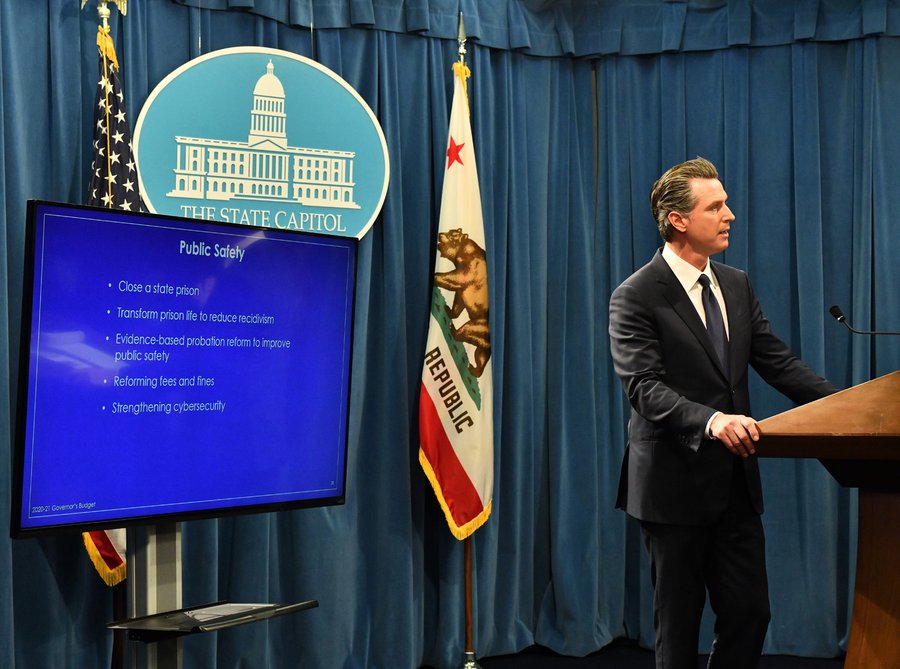
The plan affirms the governor’s long-promised goals on public schools, health care and homelessness among other progressive reforms
DELIVERING on his promises of a more liberal Golden State, California Governor Gavin Newsom unveiled a new $222.2 billion plan that bulks up funding to address some of the state’s most pressing matters including homelessness, public schools, climate change, and criminal justice reform.
“We are the world’s capital of innovation,” Newsom wrote in the state budget, released on Friday, January 10. “We have more people with access to health care and higher education than any other state. California is showing the nation and the world what big-hearted, effective governance looks like.”
And that’s what Newsom wanted to highlight in a presentation of the budget at the state capitol on Friday.
Despite all the issues plaguing Californians, unemployment is at a record low (3.9%), job growth has remained consistent for 117 months, 3.8% economic growth over the last half-decade and $19 billion in rainy day savings.
Referencing President Donald Trump’s goading of California’s issues, Newsom rejected what he calls the “California derangement syndrome.”
“If I’m not willing to stand up to a bully, if I’m not willing to stand up to someone who is attacking immigrant communities and refugees and attacking people working very hard every single day to feed their families, then I don’t belong here,” Newsom said.
The new state budget calls for closing a state-operated prison within the next five years, improving the technology used in wildfire responses, increased funding for climate change initiatives and establishing a state consumer financial protection bureau, but social reform in three areas — education, health care and homelessness — were key in the governor’s presentation on Friday.
Public schools
K-12 education, another cornerstone of the Newsom administration, comprises most of the 2020-2021 budget (28%, or $84 billion) following outrage among public school educators on low wages, mounting class sizes and staff retention.
Through Proposition 98 — an initiative from 1988 that secures minimum level funding from state and local property taxes for K-12 schools and community colleges — the state should see an increase of $3.8 billion for these schools.
One of the proposals included a $100 million grant program that will offer $20,000 to teachers who commit four years to teach in low-income schools as a way to improve the quality of teaching in poorer neighborhoods. The K-12 budget also allocates $900 million toward teacher recruitment and retention in these lower-income areas.
Calling the state of special education in California “a crisis,” Newsom also proposed that $895 million should be directed toward providing more sophisticated resources and services for students with disabilities. A special focus will be placed on early intervention and screening for preschoolers.
The nutritional value of school lunches has been an issue propagated by parents across the state who worry about the effect of frozen cafeteria food on their children. To address this, the state budget is directing $70 million toward improving the quality of food in public K-12 schools.
The initiative, first lobbied by California First Partner Jen Siebel Newsom, was inspired by the Obama administration’s efforts to improve school nutrition across the country — initiatives that have been rolled back by the Trump administration.
Health care
Amid the continuing national debate on health care, California could be the first state to implement its own generic drug label. One of the most ambitious proposals laid out in the state budget, the proposal could drastically lower the cost of pharmaceuticals for patients for whom the only options are the name brand drugs.
Generic drug manufacturers said that drug prices skyrocket because of name-brand companies, some of whom are the only manufacturers of certain medicines.
The budget also said that the state would continue to move towards a single market for drug pricing and would establish a new Office of Health Care Affordability to maintain transparency within the pharmaceutical industry.
Overall, the budget will allocate $167.9 billion towards all health and human services programs, a majority of which will be towards the funding of Medi-Cal; as previously reported in the Asian Journal, Medi-Cal is now available for all young adults between the ages of 19 to 25 regardless of immigration status.
Notably, the way the state treats mentally ill people could be changing drastically, as well. At Friday’s presentation, the governor did not provide any specific plans, but he promised to revisit the 1967 Lanterman-Petris-Short Act which limited the authority of officials to detail those with mental disorders.
Additionally, the budget secures $45.1 million for the implementation of a Behavioral Health Quality Improvement Program which will bulk up county-operated mental health and substance abuse facilities because Newsom noted that mental health treatment should be “community-based.”
Homelessness
One area that California continues to struggle in is the state’s mounting homelessness, a stain left behind from the Jerry Brown administration which Newsom has been promising to correct since he was elected governor in 2018.
Calling it “the issue that defines our times,” Newsom proposed $1.4 billion for homeless services that zero in on immediate funding for emergency rental assistance and lodging and health care facilities for those suffering from mental illnesses.
According to a 2018 count from the United States Dept. of Housing and Urban Development, California has nearly 130,000 homeless residents.
Newsom previously confirmed $4.5 billion in loans and land from tech giants Apple, Facebook and Google to support affordable housing, but this budget offers little policy changes that would make it easier for developers to build. However, Newsom said that his administration is looking to create a new government agency dedicated to housing the homeless.









